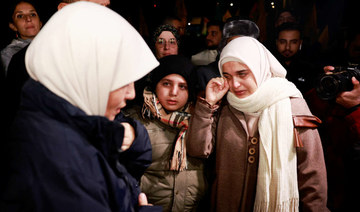NEW YORK: Donald Trump has found tremendous success from the very first moment he stepped onto the presidential stage by stoking racial animus.
Democrats expressed new outrage this week at the former president’s derisive and false charge that Vice President Kamala Harris, who is of Jamaican and Indian heritage, only recently “turned Black” for political gain. Some Republicans — even from within Trump’s own campaign — seemed to distance themselves from the comment.
But Trump’s rhetoric this week, and his record on race since he entered politics nearly a decade ago, indicate that divisive attacks on race may emerge as a core GOP argument in the three-month sprint to Election Day — whether his allies want them to or not.
A Trump adviser, granted anonymity Thursday to discuss internal strategy, said the campaign doesn’t need to focus on “identity politics” because the case against Harris is that she is “so liberal it’s dangerous.” The adviser pointed to Harris’ record on the Southern border, crime, the economy and foreign policy.
In a sign that Trump may not be coordinating his message with his own team, the Republican presidential nominee doubled down on the same day with a new attack on Harris’ racial identity. He posted on his social media site a picture of Harris donning traditional Indian attire in a family photo.
Sen. Cynthia Lummis, a Wyoming Republican who has endorsed Trump, was among a number of lawmakers on Capitol Hill who said Thursday that the rhetoric around race and identity is not “helpful to anyone” this election cycle.
“People’s skin color doesn’t matter one iota,” Lummis said in an interview.
Trump turned to an old tactic against Harris
It’s been less than two weeks after President Joe Biden ended his reelection bid and endorsed Harris. Trump has had to pivot from campaigning against an 81-year-old white president showing signs of decline to facing a 59-year-old biracial vice president who is drawing much larger crowds and new enthusiasm from Democratic donors.
Trump went to the National Association of Black Journalists convention on Wednesday. In an appearance carried live on cable news and shared widely online, he falsely suggested Harris misled voters about her race.
“I didn’t know she was Black until a number of years ago when she happened to turn Black and now she wants to be known as Black. So, I don’t know, is she Indian or is she Black?” Trump said Wednesday.
At a Pennsylvania rally hours later, Trump’s team displayed years-old news headlines describing Harris as the “first Indian-American senator” on the big screen in the arena. And Ohio Sen. JD Vance, Trump’s running mate, told reporters traveling with him that Harris was a “chameleon” who changed her identity when convenient.
Harris attended Howard University, the historically Black institution where she pledged the Alpha Kappa Alpha sorority, and has often talked throughout her career about being both about being Black and Indian American.
Some Republicans argued that Trump’s message on race is part of a broader pitch that may appeal to some Black voters.
“We’re focused on policy and how we can actually make waves and changes in the Black community. Economics, education, inflation, lowering costs. That’s what the message is,” said Diante Johnson, president of the Black Conservative Federation, which supports Trump’s efforts to win over more Black voters and hosted him at a gala in February.
Veteran Republican pollster Frank Luntz said he explored the issue during a Wednesday focus group with swing voters almost immediately after Trump’s interview. He found that Harris may be vulnerable to criticism based on her gender, but race-based attacks could hurt Trump among the voters that matter most this fall.
Much has changed, Luntz said, since Trump rose to prominence by questioning the citizenship of Barack Obama, the nation’s first Black president.
“Trump seems to think that he can criticize her for how she’s dealt with her race. Well, no one’s listening to that criticism. It simply doesn’t matter,” Luntz said. “If it’s racially driven, it will backfire.”
Eugene Craig, the former vice chair of the Maryland Republican Party, said that Trump “got what he wanted” at the NABJ convention but that the substance of his argument risked being more offensive than appealing.
“The one thing that Black folks will never tolerate is disrespecting Blackness, and that goes for Black Republicans too,” said Craig, who is Black and worked as a staffer for conservative pundit Dan Bongino’s 2012 Senate campaign. He is now supporting Harris.
Trump has a long history of racist attacks
Trump has frequently used race to go after his opponents since he stepped into presidential politics nearly a decade ago.
Trump was perhaps the most famous member of the so-called “birther” movement questioning where Obama was born. He kicked off his first campaign by casting Mexican immigrants as “rapists” and drug traffickers and later questioned whether a US federal judge of Mexican heritage could be fair to him.
While in the White House, Trump defended a white supremacist march in Charlottesville, Virginia, and suggested that the US stop accepting immigrants from “shithole” countries including Haiti and parts of Africa. In August 2020, he suggested Harris, who was born in California, might not meet the Constitution’s eligibility requirements to be vice president.
And just two weeks after formally entering the 2024 campaign, he dined with notorious white supremacist Nick Fuentes at his Mar-a-Lago residence.
Trump won in 2016 but lost reelection in 2020 to Biden by close margins in several swing states. He swept the 2024 Republican primary even while facing a raft of criminal charges.
Some Trump critics worried that his racial strategy might resonate with a significant portion of the electorate anyway. Voters will decide in November whether to send a Black woman to the Oval Office for the first time in the nation’s nearly 250-year history.
“I hope Trump’s attacks on Harris are just him flailing about ineffectively. But put together Trump’s shamelessness, his willingness to lie, his demagogic talent, and the issue of race — and a certain amount of liberal complacency that Trump is just foolish — and I’m concerned,” Bill Kristol, a leading conservative anti-Trump voice, posted on social media Thursday.
The Harris campaign thinks there’s little upside for Trump
A Harris adviser described the moment as an opportunity to remind voters of the chaos and division that Trump breeds. But the adviser, granted anonymity to discuss internal strategy, said it would be a mistake for Democrats to engage with Trump’s attacks on race at the expense of the campaign’s broader focus on key policies.
So long as the campaign does not get distracted, the adviser said, Harris’ team believes there is little political upside for Trump to continue attacking Harris’ racial identity.
Harris told a gathering of a historically Black sorority on Wednesday that Trump’s attack was “the same old show: the divisiveness and the disrespect.”
On the ground in at least one swing state, however, there were signs that Trump’s approach may be resonating — at least among the former president’s white male base.
Jim Abel, a 65-year-old retiree who attended a rally for Vance in Arizona on Wednesday, said he agreed with Trump’s focus on Harris’ racial identity.
“She’s not Black,” Abel said. “I’ve seen her parents. I’ve pictures of her and her family and she’s not Black. She’s looking for the Black vote.”
But several high-profile Republican voices disagreed.
Conservative commentator Ben Shapiro posted on X a picture of a road sign with two directions. One led to, “Attack Kamala’s record, lies and radicalism,” while the other, “Is she really black?”
“I dunno guys, I just think that maybe winning the 2024 election might be more important than having this silly and meaningless conversation,” Shapiro wrote.




























